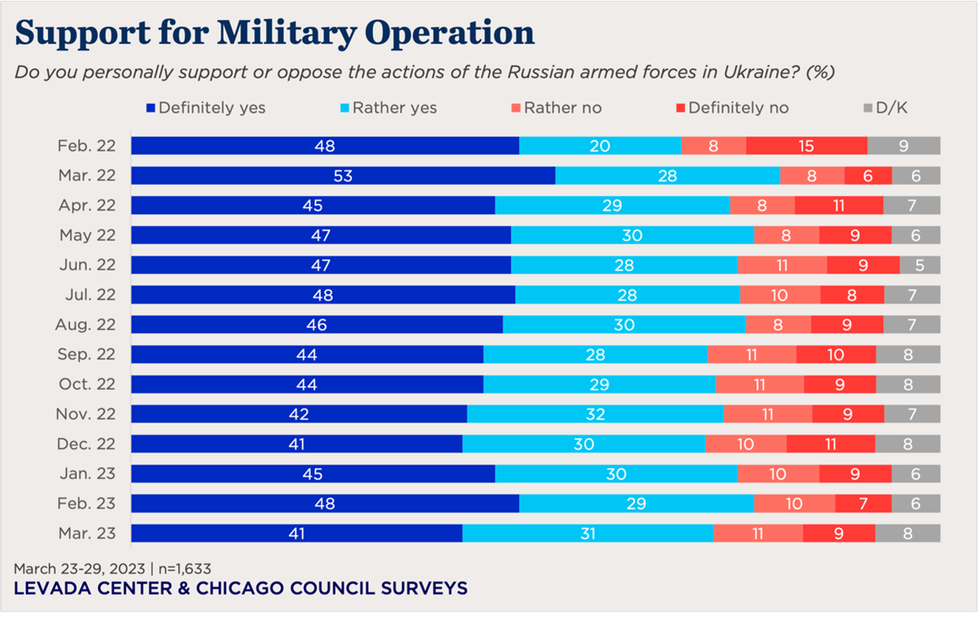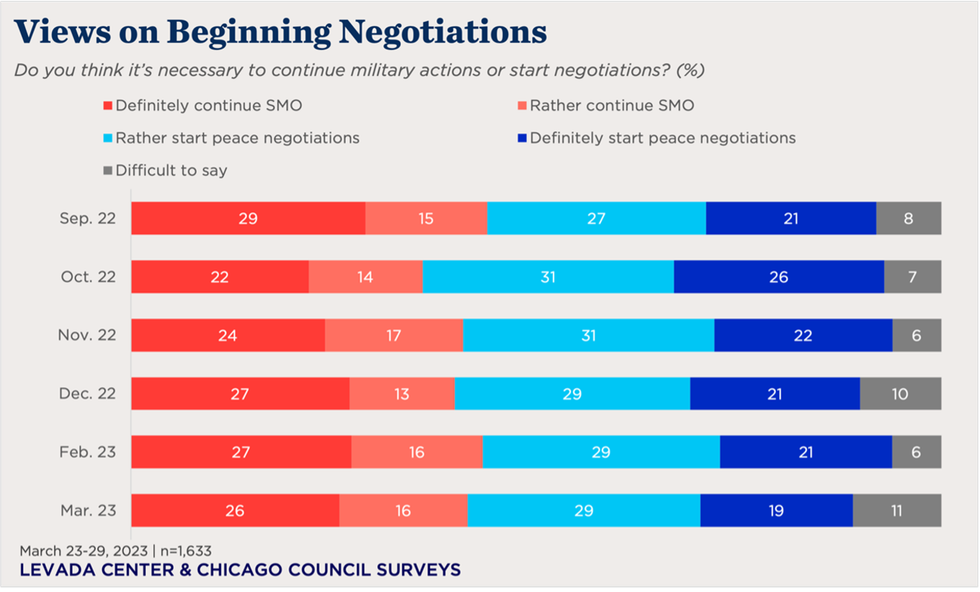Over the past year, as thousands of Russians have fled their country to avoid serving in the war, European countries have closed their borders and have cancelled or suspended visas for Russians seeking refuge. Rather than accepting war refusers as potential allies for peace, political leaders seem to hold them responsible for the war.
It is commonly assumed that Russian public opinion is in favor of Putin’s aggression, but a closer look at the most commonly cited survey and other polls on the question suggests that support for the war is soft, and that many Russians prefer negotiations to military action.
The Levada Center is the principal polling firm in Russia, an agency trusted by the Kremlin and relied upon by most Western observers. It releases a monthly report on the war based on an iterative survey of identical questions.
At first glance the results seem to confirm a pro-war stance. In the poll for March 2023, 72 percent of respondents say they support the military activities in Ukraine, a number that is consistent with earlier surveys. The number of “definitely” yes responses has declined slightly, but stands at 41 percent.
Consider the question being asked, however. “Do you support or oppose the actions of the Russian armed forces in Ukraine”? The words “war” and “military force” are not mentioned, in line with Kremlin propaganda. The “actions” in question are not specified. The question obfuscates the reality of the war and projects a veiled meaning that could be understood as “do you support the troops?” Keep in mind that repressive laws adopted since the start of the invasion make “discrediting” the armed forces a criminal offense.
The second question is more specific and shows that a plurality of respondents prefer to start negotiations rather than continue military action. In the March results, 48 percent want to negotiate while 42 percent want to continue the military operation.
The Levada surveys have found consistent support for negotiations over war. On one level, that’s unremarkable, since Putin himself has advocated negotiations, no doubt hoping to take advantage of a truce to strengthen the occupation of annexed territories and rebuild his battered forces. Support for negotiations can mean many things to different people, and demands for preconditions such as giving up Crimea would undoubtedly reduce Russian support for diplomacy significantly. The preference for negotiations is nonetheless significant in showing support for an alternative to war and reinforces the view of many in the West and internationally who believe a diplomatic process can help to end the war.
Findings from other surveys provide further insight into public opinion. In its February, 2023 poll, the Chronicle survey differentiates responses to a range of questions to identify the degree of core support for and against the war. They find a core group of 22 percent of respondents who express support for the war, believe that public funds should be spent primarily on the army and not on the social sphere, and do not support the withdrawal of troops from Ukraine or peace talks without achieving military goals.
Conversely, they find a core group of 20 percent of respondents who do not express support for the war, believe that public funds should be spent primarily on the social sphere and not on the military, and would support a decision to withdraw troops and launch peace talks without achieving military goals. The latter finding is consistent with the “no” results in the Levada surveys, but the Chronicle survey shows that the faction of active opponents of the war and the faction of its active supporters are approximately equal amidst an apathetic but perhaps persuadable society.
The Russian Field polling group released a survey in July finding that 65 percent of Russians would support Putin’s decision to end the war and sign a peace treaty immediately, and at the same time 60 percent would support his decision to start a new offensive on Kyiv. To the question, “What would you do first if you wake up tomorrow as Vladimir Putin?” the most popular response was “end the fighting.” The Field group also reported reluctance among many Russians to talk about the war, reflected in a growing number of refusals to participate in their surveys.
Taken together the studies indicate that most people in Russia tend to go along with Putin’s decisions and many feel disenfranchised and powerless to do anything about the ongoing conflict. Many prefer negotiations to war, however, and there is a solid base of antiwar sentiment, which is also evident in the many thousands who have protested and been arrested, and the hundreds of thousands who have escaped the military draft.
In the West we should avoid blaming the Russian people for a policy they did not start and many do not want. As we stand firmly against the war, we should show understanding and encouragement for the Russian people and help to nurture antiwar sentiments. We should assist and welcome the many Russians who have fled the country to oppose the war and should invite more to join them. We should support negotiations to achieve the withdrawal of Russian troops.



















